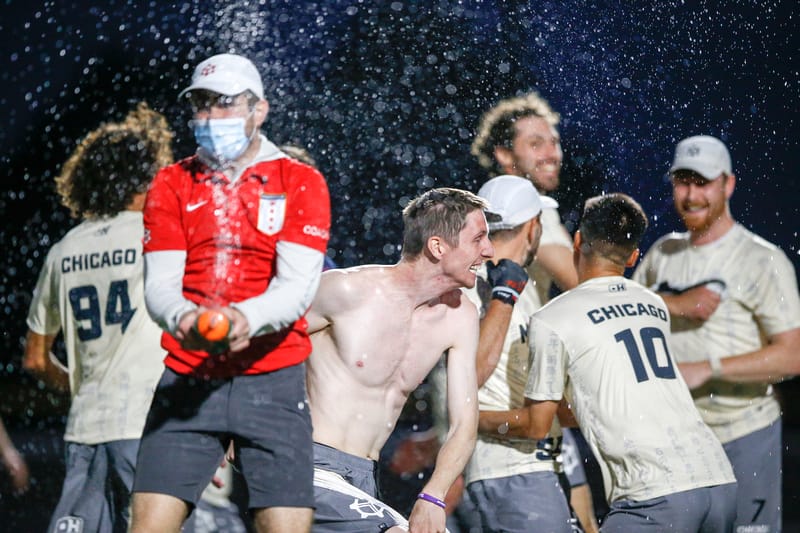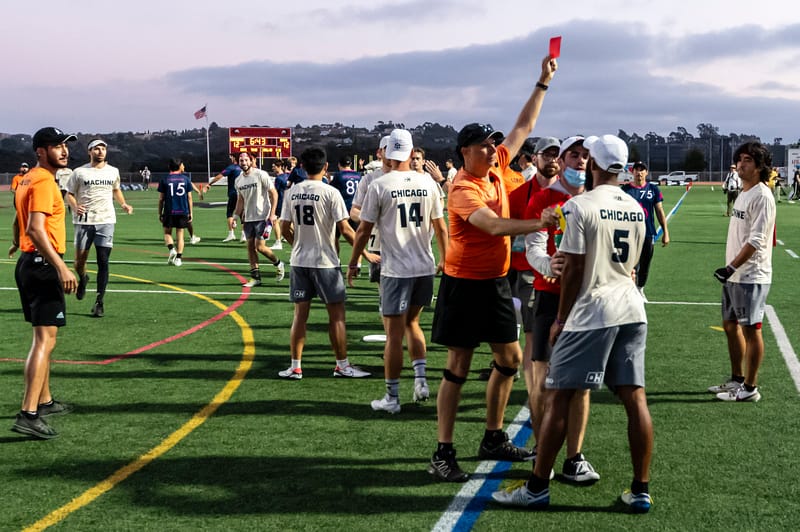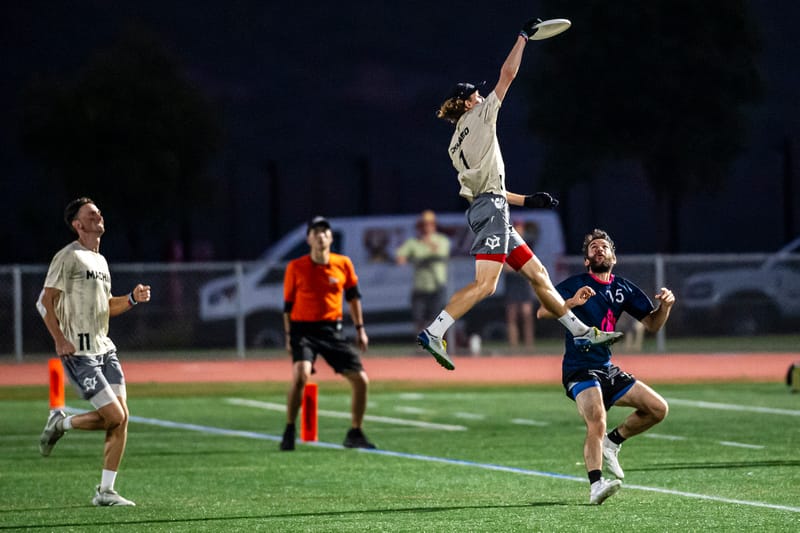Machine Dethrone Bravo after Second Half Tumult
October 22, 2023 by Edward Stephens in Recap with 0 comments

Ultiworld’s coverage of the 2023 Club National Championships is presented by Spin Ultimate; all opinions are those of the author(s). Find out how Spin can get you, and your team, looking your best this season.
In a battle between the only two undefeated men’s teams remaining in the tournament, Chicago Machine roared to life for a thrilling second half to erase a three-break deficit and defeat defending champions Denver Johnny Bravo 15-14. They held on for victory despite the absence of two-way star Johnny Bansfield at the end of the game: he earned a red card for shoving Alex Atkins and had to leave the entire field area. (Read on for details.) The universe point win sends Machine to the final for the first time since 2019.
Nothing about the first half augured well for Machine. Their win wasn’t in the stars, the bones, or the tea leaves. Bravo, on the other hand, ran the score to 8-5 the exact same way they had handled every other game in the tournament up to this point: with aplomb bordering on invincibility. Their offense did not turn the disc over once. It was rare that they let Machine so much as sniff a block. Jon Nethercutt, Alex Atkins, and Conor Tabor didn’t set a speck of dust out of place as they worked the defensive angles silly with steady side-to-side resetting. Machine were clearly trying to set up lines of attack on the disc, but they always ended up discombobulated.
Bravo’s O-line weren’t only steady, they were incisive. The first score of the game provided a chance for Noah Coolman – breaking out like a hot popcorn kernel all season long – to establish his footspeed dominance. He scorched a char line on the imitation grass as he beat his defender for an upline, dumped the disc to Quinn Finer, and then ran the remaining 50 yards to the endzone with two defenders far in his wake. Tabor connected on a perfect huck to Atkins on a different point, and both Coolman and Finer were able to win quick-step battles in the end zone to put the final touches on red zone possessions. Coolman (2G, 2A), Tabor (2G, 3A), and Atkins (2G, 4A) were the leading edge of a blistering attack.
Machine had a potent offense – any team with Joe White will have a potent offense – but they weren’t anything close to perfect in the first half. Rough patches tarnished their brilliance. They turned the disc on a red zone miscommunication between White and Nate Goff to set up Bravo’s first break. The same duo failed to connect a few points later when Goff’s deep shot stayed close enough to the sideline that White didn’t have a way to attack it in-bounds, allowing Mathieu Agee a window to sneak into the play. The Denver counters were almost as smooth as Bravo’s O-line possessions.
“We were vibing,” said Agee. “We were really happy with the pressure we were putting on. Our O-line were just getting us back out there quick and we could keep putting that pressure on theirs.”
Before the half was out, Bravo had converted three breaks. Their eighth goal was a bland-ish hold that Atkins seasoned with sass. As a long swing came his way beyond the reach of Machine’s defense, Atkins opened both arms wide in an exaggerated clap-catch. It’s a fairly standard celebration for wide open goals and easy to ignore in that context – but as a way to catch a bog-standard swing, it’s more like a squirt of lemon juice in the opponent’s eye. But give Atkins credit: after hamming up the catch, he didn’t do anything less than zip a dagger around the mark for Tabor.
Whether it was due to Machine’s halftime adjustments, statistical regression, fatigue, or just plain bad luck, Bravo’s star fell to earth like an Acme Co. anvil in the second frame. The spotless porcelain that had been their first half started to chip. Coolman, who had been enjoying one of the most remarkable tournaments of the entire division, misread the field and floated a backhand to the defense instead of to Denny Bechis: it would prove to be only the first of many Bravo throwing errors in the half.
Then the Johnny Bansfield show began. He had shown some sparkle in the first half, but it was muted behind the brightness of Bravo’s full-team effort. As soon as Bravo started to lose their luster, he became one of the brightest stars on the field. He expertly led Machine 70 yards to their first break, directing traffic to open a lane for a Connor McHale goal. They nearly tacked on another right away after another Bravo throwing error. Goff dropped the scoring pass that would have brought them to within one, and Atkins, for Bravo’s second possession of the point, took control to huck the team to the goal line. He then used a blade to send Seth Faris to the open spot on the field – the throw prompted the cut, not vice versa – for the hold.
Despite the score and the lead, it was clear from then on that the tenor of the contest had shifted significantly. One of the most visible causes for the shift was Machine’s second half commitment to running a full-on zone. “In the first half we played a lot of man and little junky sets. In the second half we came out with an actual zone look,” said Chicago’s Pawel Janas. “That slowed them down a little bit, made them think about their throws.”
Their twitchy front four and savvy wing angles added an extra layer of thought not only for Bravo’s throwers, but also for their cutters. Second-guessing became an integral part of every Bravo offensive drive, virtually eliminating the kind of seamless, first thought catch-and-throw-and-catch-and-throw continuations sequences that had proven so effective for them in the first half. And sometimes that extra layer of hesitation yielded turnovers – such as when Finer decided against taking the two steps up field for a bump cut after a pass into the middle of the field, and Coolman’s instinctive dish pass went to no one. Kyle Rutledge picked the disc up and immediately glided a backhand thirty yards for Tim Schoch to cut the deficit to a single point at 9-8.
Machine’s defense wasn’t the only thing that changed: they also cleaned up the stray hairs that had mussed the first half offense. White (1G, 4A), Bansfield (3A), Janas (2G, 2A), Paul Arters (4G, 2A), and Keegan North (3G) began to execute on a sublime plane. Bravo’s defense, even when they were close, simply ceased to be a concern for them. They hit their spots with the kind of unfussed professional perfection of a veteran housekeeper putting the finishing touches on a wrinkle-free turn down service.
Still holding an 11-10 lead, Bravo once again embarked on a molasses march in pursuit of a hold. Atkins had shown remarkable patience and forethought for much of the game, but he lost his patience near the defending brick and threw a prayer of a huck into the deep space: Schoch was more than ready to pick it off. Goff – who despite a handful of errors was still one of Machine’s strongest contributors in the game – leveled the score with a scorching forehand to give Schoch bookends.
The comeback to that moment was already wild. And then, as Machine fought to take their first lead of the game, the game descended into chaos. One turnover, two turnovers, three turnovers, four turnovers – Machine kept taking the disc from Bravo (including a Bansfield-patented explosive layout catch block) but missing on their scoring opportunities. It looked like Machine had finally taken the lead on their third break chance when Goff rose like an angel above Agee to catch a Jason Vallee huck. However, a travel call on the throw before the huck, even though it was overturned, negated the play. Vallee’s next forehand attempt slipped out of his fingers out of bounds.
“I’m sure it seems like a lot of those are unforced turns, but that’s pressure,” said Agee. “The pressure’s building, and you can feel the energy from the crowd, the energy from the sidelines, and you’ve just got to dive into it and embrace the moment and know that whatever turn happens you’ve gotta just fight to get the disc back. I think both teams embraced that mind set. And that’s how a crazy point like that happens.”
“Did we score that point?” asked Agee. “I don’t even remember honestly.”
Reader, they did. Bravo would finally earn the hold three possessions later on an Atkins hammer. They still had the lead at 12-11. But they were rattled, and the stadium was roaring with pro-Machine sentiment.
“As a competitor at this level, you want to be able to release that energy… Every huddle we come together, and we know that it’s all about us… We release everything else,” said Agee. “But that crowd was definitely crazy… When you’re playing, when you’re on the field, when you’re in the thick of it, you’re just putting your all into it and trying to release everything to just be there with your teammates. But I know the crowd plays probably more of a part than we let ourselves believe.”
After another brilliant offensive point from Machine – Malik Auger-Semmar made a stunning dash to the back line to bring in a blistering Arters huck – hell broke loose. Bravo, for the first time in the half, played a clean offensive point. It ended with another crossfield hammer, this time from Tabor to Atkins, to keep the late lead at 13-12.
But Bansfield, who thought about bidding for a block before pulling up short, made some light incidental contact with Atkins on the play. Perhaps taking umbrage at the bump, or perhaps just being his typical taunting self, Atkins stared Bansfield down after the catch and buried the disc into the turf with a thunderclap of a spike. Bansfield did not appreciate the gesture in the least, and he reacted by shoving Atkins in the back. It wasn’t a hard shove, but it was enough to make the full complement of players from both sides spill into the scene, partly to have each other’s backs in the event of more physicality, and partly in an effort to keep the now-fragile peace. It was a tableau more reminiscent of Hieronymus Bosch’s nightmares than an ultimate frisbee semifinal.
The observers immediately awarded a red card to Bansfield, and according to the rules he had to leave the field area entirely.1

“My first thought was, ‘Oh shit, we just lost Johnny,’” said Janas. “We want Johnny Bansfield on the field in the last quarter of the game. That was a big, big, big loss.”
“But also it was completely preventable. We know that Atkins likes to talk, and sometimes he gets underneath your skin. But that is a known quantity. That’s nothing that we shouldn’t have expected. And unfortunately Johnny did not handle that moment as he should have,” said Janas.
“You never want to have moments like that. Both teams want it so bad, and hopefully you can keep it to healthy competition,” said Agee. “But that was crazy. That was wild. It seemed like an energy turning point in the game. You could just kind of feel that the energy in the air switched.”
Now missing arguably their most important two-way player and needing a last-quarter break in order to win the game, Machine suffered the further setback of having to start the next offensive point in the middle of their own end zone at the reverse brick. That was because McHale had earned a yellow card earlier in the game. A red card counts as two yellows, and so Machine had reached the three-card limit to trigger yardage consequences with every ensuing infraction. If the field position made them feel any pressure, though, they didn’t show it.
“If you have to go 70, you go 70. If you have to go 85, you go 85,” said Janas. “The level of poise, the level of grind that this team, that this O-line has is above and beyond anything that Machine has had since at least 2014.”
Once they worked it out of the Callahan-zone, White simply stepped into the kind of Parkay-smooth flick huck he’s been throwing for years, leading North into the end zone to re-tie the game at 13-13.
Bravo, still stumbling, made another execution error on the next point, bouncing a backhand well over Bechis’ open continue cut. It had enough float that Bechis could pursue it for a potential catch anyway, but any notion he had of saving the errant pass was obliterated by a video game vertical jump from Machine’s Andrew Sjogren. It was a colossal block. Sjogren would take an injury substitution afterwards because Bechis had accidentally set up underneath his landing zone causing a bad landing.2

With Bansfield unavailable, White led the charge. It was a beautiful sequence, and he found North again to give Machine a 14-13 lead.
Bravo had more fight in them, though. Atkins and Coolman ran a flawless red zone set, and Bechis slipped free of his matchup to send the game to universe point.
But Bravo wouldn’t get even the slightest chance to break for the win. In a reversal of Bravo’s first half, Machine’s O-line played a perfect second half. “The O-line knew [for the whole second half] that best-case scenario, it’s going to come down to universe. All ten of us on O-line knew that it was going to come down to us,” said Janas. “They have our backs when we screw up in the first half, and we have their backs when they’re fighting hard in the second half and we have to put in those easy, clean holds to put Bravo’s offense back onto the field.”
Machine played a textbook cut-and-clear game deep into Bravo territory to press their advantage – and then they centered the disc to White ten yards from victory. It culminated in one of the sport’s iconic recurring images: White slipping a backhand around the outside of a force-flick mark.
“Game over,” said Janas of the moment he saw the step-around move.
It almost goes without saying that the delivery was a perfect in-stride shot to Arters’ chest. As soon as he caught it, Machine stormed the field in an orgy of joy, peeling off their jerseys and spraying a fine mist from their sports bottles, leaping, hollering, and embracing. It was the only possible reaction to the kind of moment that has eluded them for years. “The frustrations over the last couple of years have built to this moment,” said Janas.
Machine now face one more test in their quest for the program’s first championship: a worthy Truck Stop side in Sunday’s final. “Job’s not finished,” said Janas.
For Bravo, the magical San Diego ride that began almost a year ago finally comes to a close. “We have prepared so many hours to make the most of these moments. And every huddle, we breathe in, we breathe out. We know we’re with each other for this. Together. We’ve worked so hard to be here,” said Agee. “Valuing every moment is what we try to do, and I think we did that from the first point versus Truck [on Thursday]. Even from warm-ups. Love in the warm-up. Love in the work. I’m really proud of us.”
“It’s a one-throw difference in [the semifinal],” said Agee. “All of that insanity – and all you can do is love the process, put everything you can into every moment, and the result will make itself. So.”
Although, as the broadcast showed, Bansfield found an inventive way to keep an eye on the action afterwards. ↩
Sjogren received medical attention at a hospital after the game and is banged up but okay. ↩